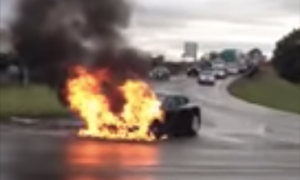Affordable Laptop Service advises Safety First for the most urgent laptop catastrophe…FIRE!Of course you want to save your laptop, but how you deal with a laptop fire can be a life and death matter. It would seem logical to disconnect the ac power source from the wall. However, this won’t put out the fire. In fact, a battery that has escalated to the point of spontaneous combustion will continue to burn even if ejected from the laptop. On this page is presented some of the best pertinent information available online from a variety of sources. Laboratory simulation of a laptop battery fire. Don’t try this at home, kids. This was posted at cnet.com as “How to put out a laptop/battery fire…”
Below are a few informative websites on battery fire safety and fire extinguishers:The following few paragraphs remain posted as “Being Smart with Laptop Batteries” …We have been dealing with the largest recall in history that the laptop segment has ever had. This one is particularly important because the result of a battery failure, which could come at an increasing rate, is a very hot fire that is potentially life threatening and incredibly difficult to put out. This points out the danger of any technology that stores energy. Even a Cell phone, were it to short out, could create a fire or cause a burn suggesting that if the battery on one is damaged it should be replaced immediately. But laptops have large batteries and their danger is simply greater which is why both Dell and Apple did the right thing and issued a recall placing the safety of their customers ahead of their own need to control cost and protect the brand. Sadly, in this case, it wasn’t their fault but it was their problem to address it and fortunately Sony is covering their costs. However there remain a couple of things that concern us. When we started down this path Sony was adamant that only Dell was impacted because the batteries came off a manufacturing line that had been dedicated to Dell. Then Apple announced their recall and it was clear, and we’ll be kind here, that Sony was “mistaken”. Our understanding is that the root cause of this problem is a combination of a manufacturing process shared across multiple Sony lines. Rough estimates suggest that something like 2M additional batteries attached to laptops from other vendors will remain active in the market after the Dell and Apple recalls finish. At this time (August 30th, 2006) we can’t be sure who the remaining vendor is but this information does suggest that it would be prudent to be careful regardless of who made your laptop computer. Laptop Battery Safety Recommendations
However this all turns out, be prudent and be safe, you should not be afraid of your batteries but you should, much like you do with other hazardous materials, treat them appropriately and if yours is under recall make sure to replace it as quickly as possible. To check for battery recall, take the link from the manufacturers’ name to the support page of your laptop’s maker. |
Laptop Fire Update
Whereas laptop fires caused by defective lithium ion batteries used to be more common, the danger still exists. From an article dated 06/30/2014 titled Bucks County Woman Injured When Laptop Computer Explodes comes the following . . . “Langhorne-Middletown Fire Company Chief Frank Farry has been fighting fires for 25 years and says he’s never seen anything like it. Farry says the evidence has been collected, but it appears the battery pack inside the computer went off like a bomb, sending debris six to eight feet away.” And in the same article is found . . “Fire experts say fires involving lithium-ion batteries in laptops are rare, but can happen. They say problems can occur when a laptop is being used with a fully charged battery while it’s plugged in.”
 While it may be comforting to know that laptop fires are rare now, the danger is now going on the the road. See After 3 Fires, Safety Agency Opens Inquiry Into Tesla Model S, and Batteries in Electric Cars Examined After Chevy Volt Fire. The other side of this is that while laptops are common, electric vehicles are still the exception rather than the rule. Hopefully improvements in battery technology will make batteries for electric vehicles safe on the highways of the future..
While it may be comforting to know that laptop fires are rare now, the danger is now going on the the road. See After 3 Fires, Safety Agency Opens Inquiry Into Tesla Model S, and Batteries in Electric Cars Examined After Chevy Volt Fire. The other side of this is that while laptops are common, electric vehicles are still the exception rather than the rule. Hopefully improvements in battery technology will make batteries for electric vehicles safe on the highways of the future..
More fire safety suggestions by public recommendation:
- Burns: First Aid for Pets
- Burn Prevention and Fire Safety Tips
- Disaster Safety for People with Disabilities: What to Do When Emergency Weather Strikes
- Driving to Safety: The Car Owner’s Guide to Emergency Evacuation
- Fire and Smoke Damage Restoration and Repair – Average Costs
- Fireplace and Chimney Problems, Tips & Prevention
- Fire Safety for Kids: Sparky the Fire Dog
- Home Fire Safety for Older Adults (This is lengthy – skip to page 7!)
- Home Improvements to Prevent Kitchen Fires
- How to Prepare for a Wildfire
- Open Campfire Safety Rules
- Survive the Unthinkable if Wildfire Threatens Your Home
